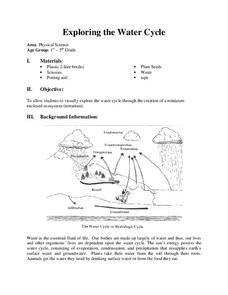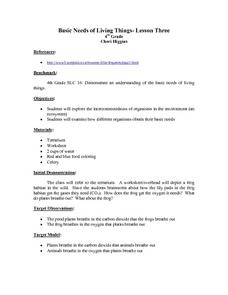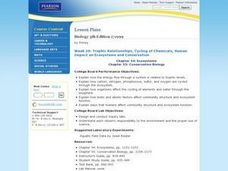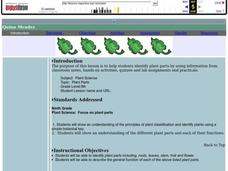Curated OER
Food Webs and Making Miniature Ecosystems
Students model a food web and create a miniature ecosystem. In this animal interactions lesson, students engage in a role playing game which simulates a food web. Students then build miniature ecosystems using pop bottles, snails, plants...
Curated OER
A Symphony of Decomposers
Students discover decomposition. In this environmental lesson, students explore different types of decomposers and their role within the ecosystem. Students also discover how waste interferes with the decomposition process.
Curated OER
Exploring the Water Cycle
Students investigate the water cycle. In this water cycle lesson, students create an ecosystem within a 2-liter bottle. Students record scientific observations as they observe the water cycle within their ecosystem.
Curated OER
Venus Flytrap
Students study the Venus Flytrap including its habitat and how it eats. For this ecology lesson students complete several experiments using a Venus Flytrap to see how it reacts to various conditions.
Curated OER
WET Science Lesson #3: Comparison of Aquatic and Terrestrial Plants
Elementary life science explorers compare and contrast aquatic and terrestrial plants (elodea and soybeans) in a Venn diagram. Some background information is provided to support direct instruction, and general instructions are provided...
Curated OER
Ecosystem Energizers
Fourth graders see how the flow of energy through an ecosystem made up of producers, consumers, and decomposers carries out the processes of life and that some energy dissipates as heat and is not recycled.
Curated OER
Territorial Behavior in Crickets
Students explore the behavior of crickets during courtship. They measure the number and types of interactions between household crickets. Students discriminate between quantitative and qualitative observations. They collect data to...
Curated OER
Basic Needs of Living Things-Lesson Three
Fourth graders explore the interconnectedness of organisms in the environment and examine how different organisms obtain their basic needs. They discuss a frog's habitat and what is found in it. Students discuss the processes of...
Curated OER
Mini-Ecosystems
Third graders identify the living and non living things in a book read aloud and discuss the interactions represented in the book. Then, they research and include a list of food that each animal needs in an ecosystem. Finally, 3rd...
Curated OER
PLANT LIFE CYCLES
Student learns about the life cycle of plants by watching a time-lapse video. This activity provides learners with further evidence that all living things grow and change as they progress through their life cycle.
Curated OER
Creature Features
Learners examine why certain animals live in only specific places throughout the world. Using animals, they classify them based on their characteristics and identify their basic needs. They also observe and compare the life cycles of...
Curated OER
Spider Activities, Experiments and Projects
Young scholars examine seven spiders and put them into two or three groups based on their structural similarities. In groups, they create a cladogram proposing possible ancestral relationships. Students design an experiment related to...
Curated OER
LOOKING AT LAWNS
Students investigate the importance of plants to animals by exploring their own schoolyard. They record relevant observations, findings, and measurements, using written language, drawings, charts, and graphs. They describe ways in...
Curated OER
The Mechanisms of Decay and Decomposition
Eighth graders study how all living things die. They are introduced tot he life cycle and the concept of an ecosystem. Students have a introductory exposure to trophic levels (producer-consumer-decomposer) in the environment.
Curated OER
Classroom Animals and Pets - Insects and Co.- Walking Sticks
Learners observe walking stick insects. They prepare a habitat for a walking stick. Students discuss the characteristics of these insects. They examine the parts of the body.
Curated OER
Trophic Relationships, Cycling of Chemicals, Human Impact on Ecosystems and Conservation
Students explore how the energy flow through a system is related to trophic levels. They investigate how organisms affect the cycling of elements and water through the biosphere. Students participate in lab activities to observe ways...
Curated OER
What Does It Eat?
Students use crickets, mealworms, and pill bugs and observe what they choose to eat. In this science lesson plan, students record data, create graphs, and do a write up on what they see happening.
Curated OER
You talkin' to me?: Investigations in animal behavior
Students examine how to develop and conduct scientific investigations of animal behavior. In this animal behavior lesson students view a video, play an interactive game and complete a lab exercise.
Curated OER
Habitat Choice in Woodbugs
Learners investigate woodbugs. In this scientific investigation lesson, students explore the steps scientists take when conducting an investigation using live specimens. Learners explore habitat preferences for woodbugs in various...
Curated OER
Mold
Students explore mold, the different types and the health risks that they pose. In this mycelium lesson students grow different molds and see which type of foods mold the fastest.
Curated OER
Plant Parts
Ninth graders identify plant parts by using different classification methods. In this plant lesson students observe and draw different types of leaves then classify them according to species.
Curated OER
How Much Water Does A Tree Transpire In A Day
High schoolers engage in a lesson of investigating the amount of water that is transpired in a one day cycle. They conduct research to find the purpose of transpiration and find information to explain the value to a plant and explain how...
Curated OER
The Effects of Solar Energy
Learners examine how solar energy is absorbed and used. In this solar energy lesson students complete several activities that allow them to better understand solar energy.
Curated OER
Mountain Building
Fourth graders identify variables that influence rates of change. They, through group consensus and using the assigned materials, design and build what they believe to be the strongest mountain possible.
Other popular searches
- Science Project Terrarium
- Ecosystem Bottle Terrarium
- Carbon Cycle Terrarium
- Making a Terrarium
- Soda Bottle Terrarium
- Building a Terrarium
- Terrarium Science Experiment
- Rainforest Terrarium
- Terrarium and the Water Cycle
- Rain Forest Terrarium
- Water Cycle Terrariums
- Mini Terrariums

























